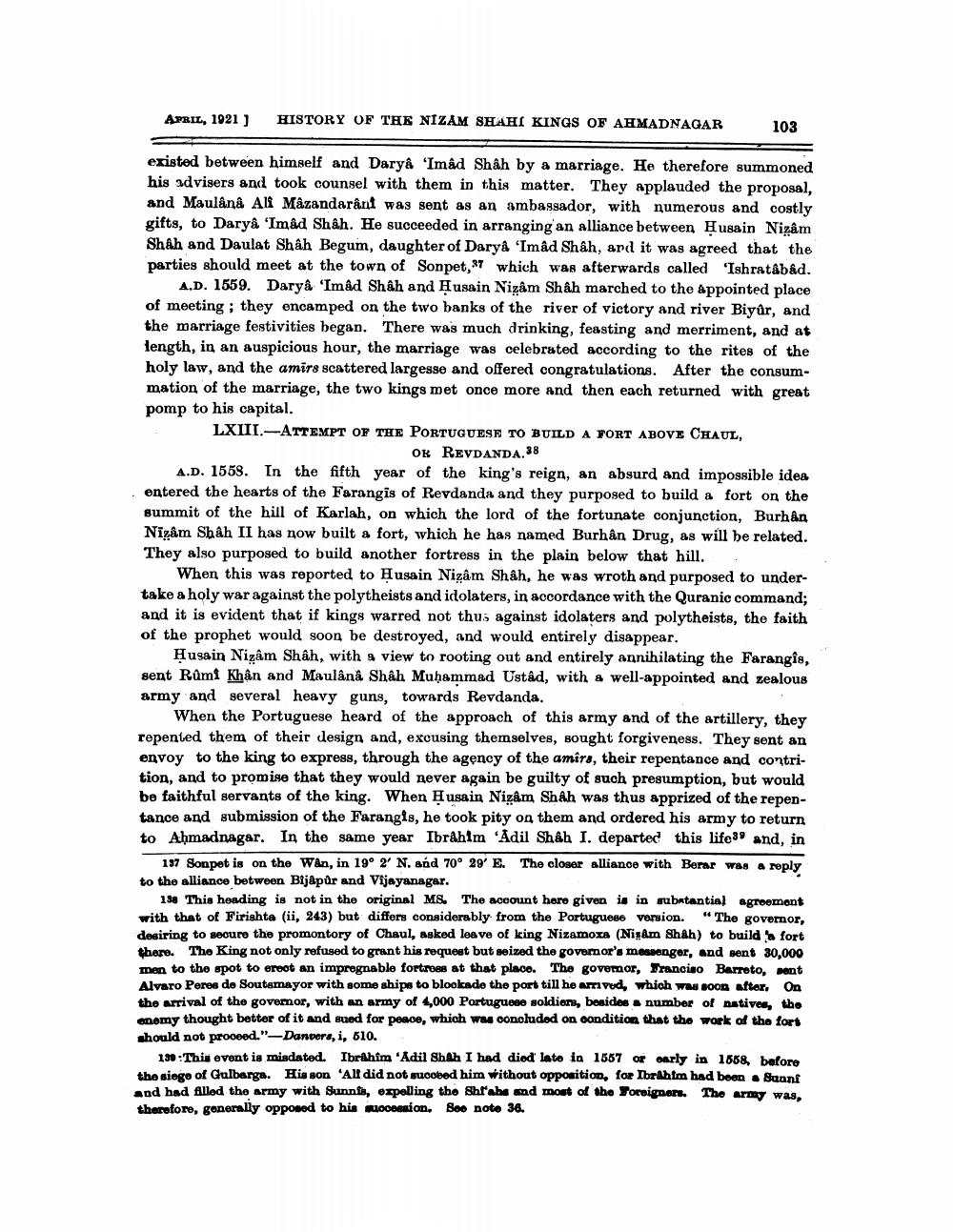________________
APRIL, 1021 )
HISTORY OF THE NIZAM SHAHI KINGS OF AHMADNAGAR
103
existed between himself and Darya 'Imad Shâh by a marriage. He therefore summoned his advisers and took counsel with them in this matter. They applauded the proposal, and Maulana Ali Mazandarant was sent as an ambassador, with numerous and costly gifts, to Darya 'Imad Shah. He succeeded in arranging an alliance between usain Nizâm Shah and Daulat Shâh Begum, daughter of Darya 'Imad Shah, and it was agreed that the parties should meet at the town of Sonpet,*7 which was afterwards called 'Ishratâbâd.
A.D. 1559. Darya 'Imad Shah and Husain Nizâm Shah marched to the appointed place of meeting ; they encamped on the two banks of the river of victory and river Biyûr, and the marriage festivities began. There was much drinking, feasting and merriment, and at length, in an auspicious hour, the marriage was celebrated according to the rites of the holy law, and the amirs scattered largesse and offered congratulations. After the consummation of the marriage, the two kings met once more and then each returned with great pomp to his capital. LXIII.-ATTEMPT OF THE PORTUGUESA TO BUILD A PORT ABOVE CHAUL,
OK REVDANDA.38 A.D. 1558. In the fifth year of the king's reign, an absurd and impossible idea entered the hearts of the Farangis of Revdanda and they purposed to build a fort on the summit of the hill of Karlah, on which the lord of the fortunate conjunction, Burhan Nizâm Shah II has now built a fort, which he has named Burhân Drug, as will be related. They also purposed to build another fortress in the plain below that hill.
When this was reported to Husain Nizam Shah, he was wroth and purposed to undertake a holy war against the polytheists and idolaters, in accordance with the Quranic command; and it is evident that if kings warred not thus against idolaters and polytheists, the faith of the prophet would soon be destroyed, and would entirely disappear.
Husain Nizâm Shah, with a view to rooting out and entirely annihilating the Farangis, sent Rūmi Khân and Maulana Shah Muhammad Ustâd, with a well-appointed and zealous army and several heavy guns, towards Revdanda.
When the Portuguese heard of the approach of this army and of the artillery, they repented them of their design and, excusing themselves, sought forgiveness. They sent an envoy to the king to express, through the agency of the amîrs, their repentance and contrition, and to promise that they would never again be guilty of such presumption, but would be faithful servants of the king. When Husain Nizam Shah was thus apprized of the repentance and submission of the Farangis, he took pity on them and ordered his army to return to Ahmadnagar. In the same year Ibråhim 'Adil Shah I. departed this life3' and, in
197 Sonpet is on the Wan, in 19° 2' N. and 70° 29' E. The closer alliance with Berar was a reply to the alliance between Bijapur and Vijayanagar.
188 This heading is not in the original MS. The account here given is in mubatantial agreement with that of Firishta (ii, 243) but differs considerably from the Portuguese version. "The governor, desiring to secure the promontory of Chaul, asked leave of king Nizamoza (Nisâm Shih) to build fort there. The King not only refused to grant his request but seized the governor's messenger, and sent 30,000 men to the spot to eroot an impregnable fortroes at that place. The govemor, Tranciso Barreto, rent Alvaro Peres de Soutamayor with some shipe to bloolade the port till he arrived, which was soon after. On the arrival of the governor, with an army of 4,000 Portuguese soldion, besides a number of natives, tho enemy thought better of it and sued for peace, which was concluded on oondition that the work of the fort should not proceed."-Danders, i, 510.
130 : This event is mindated. Ibrahim Adil Shah I had diod' lato in 1567 or early in 1868 before the siege of Gulbarga. His aon 'All did not sucobed him without opposition, for Ibrahim had been . Sunnf and bad Alled the army with Sunnta, expelling the Shtabe and most of the foreigners. The army was. therefore, generally opposed to his loovaion, Soo noto 36.




